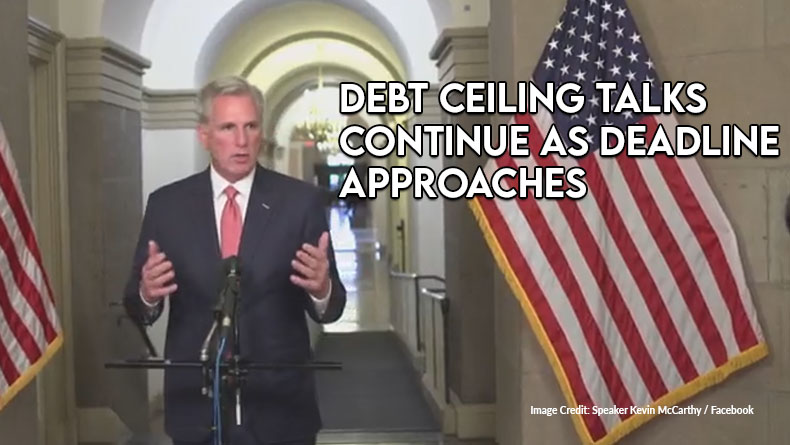Image Credit: Speaker Kevin McCarthy / Facebook
The Center Square [By Brett Rowland] –
Both sides agreed some progress was made Tuesday in talks over the nation’s debt ceiling ahead of a June 1 deadline.
President Joe Biden and Vice President Kamala Harris met with House Speaker Kevin McCarthy, House Minority Leader Hakeem Jeffries, Senate Majority Leader Chuck Schumer and Senate Minority Leader Mitch McConnell on Tuesday in the White House.
McCarthy said a deal could be reached before the June 1 deadline as discussions continue.

“It is possible to get a deal by the end of the week,” McCarthy, R-Calif., said after the meeting, although he said the sides are still far apart on terms. McCarthy said Biden’s decision to appoint people Tuesday to work with his negotiating team was “productive.”
McConnell said, again, that Biden and McCarthy need to make a deal.
Schumer, D-New York, also said the meeting was productive.
“Everyone agreed that default would be the worse outcome – a horrible situation for America and America’s families,” he said. “But we also agreed that we need to pass a bipartisan bill with bipartisan support in both chambers.”
House Republicans passed a bill to reduce spending by almost $5 trillion and increase the debt limit by about $1.5 trillion, or until March 31, 2024, whichever comes first. The Republican bill would strip energy and environmental tax credits from the Inflation Reduction Act and formally block Biden’s student loan cancellation. It also would put work requirements in place for some federal social programs, such as requiring Medicaid recipients to work 80 hours per month.
Schumer said that bill was not bipartisan.

U.S. Treasury Secretary Janet Yellen said lawmakers must raise the debt ceiling by June 1 or risk a default on U.S. debt obligations. But when exactly the U.S. will run short remains an estimate. On Tuesday, Yellen said the U.S. Department of the Treasury said “it is impossible to predict with certainty the exact date when Treasury will be unable to pay all of the government’s bills.”
The debt ceiling is the maximum amount of debt the U.S. Department of the Treasury can issue.
“Our current best estimate underscores the urgency of this moment: it is essential that Congress act as soon as possible,” Yellen said Tuesday at Independent Community Bankers of America 2023 Capital Summit. “In my assessment – and that of economists across the board – a U.S. default would generate an economic and financial catastrophe.”
Last week, the nonpartisan Congressional Budget Office projected that “if the debt limit remains unchanged, there is a significant risk that at some point in the first two weeks of June, the government will no longer be able to pay all of its obligations.”
Earlier on Tuesday, U.S. House Majority Leader Steve Scalise, R-La., put the blame on Biden.
“Why did the President wait until we’re only days away when from that X-date when he could have been negotiating back in February?” Scalise said at a news conference Tuesday morning. “We know the date is not an exact number, it may be a couple of days before, a couple of days after. That’s out of our control. But at the end of the day, we’ve all know it is going to be around this time.”
Scalise said Biden has yet to put forth his own plan except for asking Congress for a “blank check,” which Scalise said even the Democrat-controlled Senate couldn’t pass.
“The President has been running out the clock for months,” Scalise said.
Last week, the Congressional Budget Office released its Updated Budget Outlook, which projects the budget deficit will total $1.5 trillion this year and rise to $2.9 trillion by 2033. It also projects the national debt will reach a record 107% of the economy by 2028 and grow to 119% by 2033.

Maya MacGuineas, president of the Committee for a Responsible Federal Budget, said it was time to reduce the nation’s deficit.
“If ever negotiators needed a sign they should be pursuing deficit reduction, this is it. We absolutely must raise the debt limit as soon as possible – without drama and without any threat of default,” she said in a statement. “At the same time, inflation and interest rates are too high and our fiscal path is unsustainable. We need over $8 trillion of ten-year deficit reduction just to hold debt at its current share of the economy.”
MacGuineas said any plan to address the nation’s debt must include changes to Social Security, Medicare and the tax code. She said progress could be made by enacting multi-year discretionary spending caps.
“With inflation surging and debt approaching a record share of the economy, there is little time to waste,” she said. “And with the debt limit deadline well in sight, lawmakers must act as soon as possible to make sure the country can pay its bills. Default cannot be an option.”




